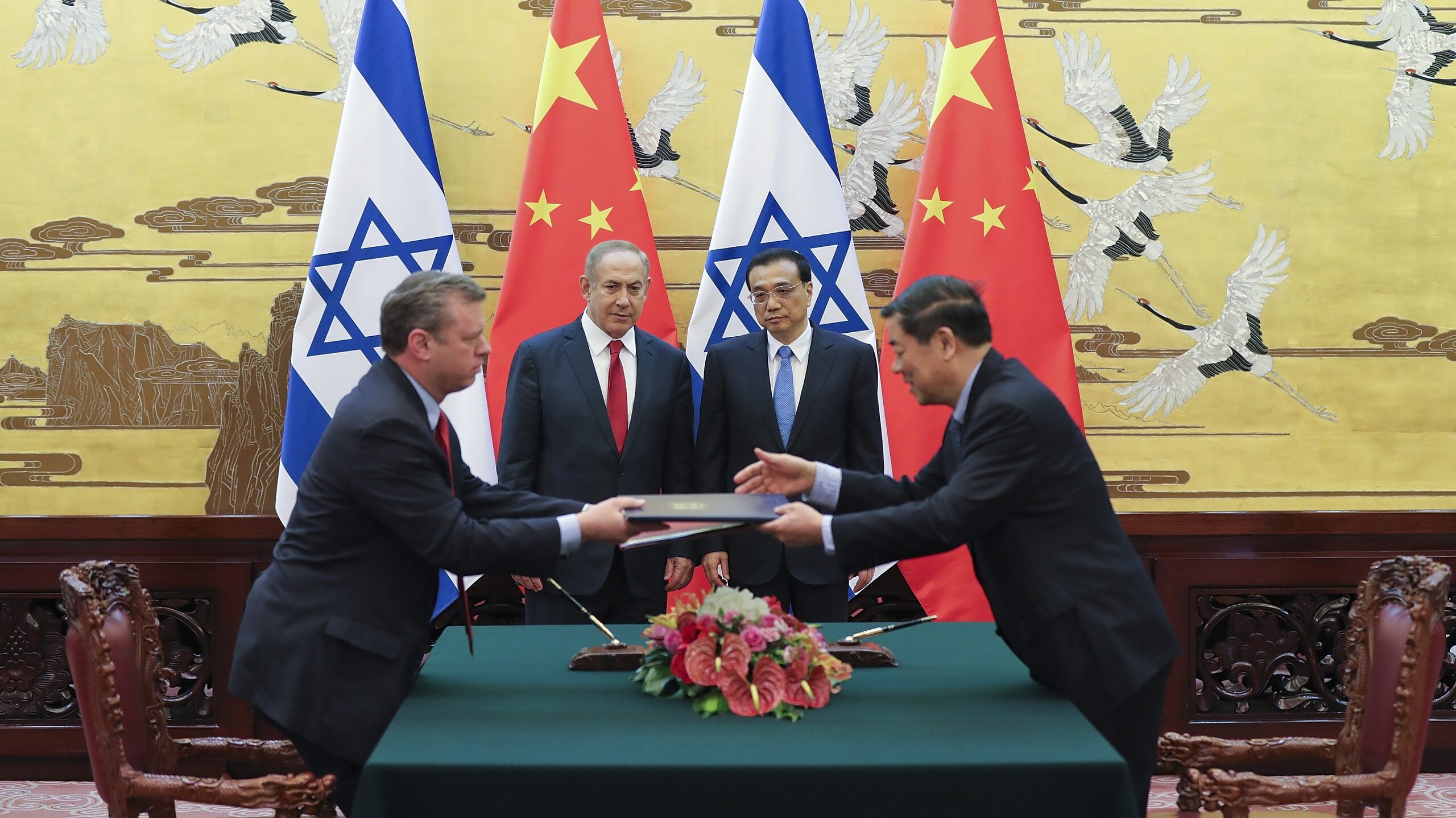Netanyahu’s Chinese Visit: ‘Desperate Search for a Win’ Amid Domestic Turmoil
Israeli prime minister's upcoming visit to China, his fourth, is perceived as a strategic move to offset the chaos of his home country's political situation
Israeli Prime Minister Binyamin Netanyahu is planning his fourth prime ministerial visit to China after receiving an invitation from the country late last month, his office has announced.
China’s invitation follows its recent attempts to enhance its diplomatic and economic ties in the Middle East amid heightened tension between the Biden Administration and Netanyahu’s right-wing government.
Galia Lavi, deputy director of Israeli-China studies at the Institute for National Security Studies in Tel Aviv, told The Media Line that Netanyahu is desperately seeking a win to offset his many domestic crises.
She said that “after more than six months of a chaotic atmosphere in Israel and a diplomatic boycott from the US and Europe,” Netanyahu was hoping for diplomatic success in China, such as “signing a big infrastructure project” with China, obtaining Chinese help to improve Israeli-Saudi relations, or leveraging China’s influence over Iran to prevent the Islamic Republic’s construction of a nuclear weapon.
Netanyahu is in a tough position
However, Lavi warned that given current China-US tensions, the Netanyahu visit could undermine Israel-US ties.
“Netanyahu is in a tough position,” Lavi said. She said the Biden Administration was already deeply critical of Israel’s government and a visit to China would only add “to the general US displeasure” towards Israel.
China’s growing Middle East profile was made abundantly clear in April when it surprised observers by successfully brokering a rapprochement between Iran and Saudi Arabia.
China is both Saudi Arabia’s and Iran’s leading trade partner and their most significant purchaser of oil. China signed a 25-year economic cooperation deal with Iran in 2021 and a comprehensive strategic partnership with Saudi Arabia in 2022. Today, China imports half its oil from the region.
Chinese investment in the Middle East has grown apace. In 2022, roughly 23% of China’s Belt and Road investment went to the region, up from 16.5% the previous year. China is now the primary trading partner for countries in the Gulf Cooperation Council. In 2021, those trade flows topped $300 billion.
China’s regional appeal is also based on a shared approach to international affairs, said Dawn Murphy, associate professor of national security strategy at the US National War College.
Like China, many Middle Eastern countries are concerned with protecting their sovereignty in the face of US power and with boosting the global profile of non-Western states. In addition, Middle Eastern rulers view China as an ideologically neutral trading partner that politely refrains from interfering in other countries’ internal affairs.
Maria Papageorgiou, an international relations lecturer at University College London, told The Media Line that this “noninterventionist” approach appeals to Middle Eastern governments, as Chinese cooperation “doesn’t come with strings attached.” Unlike the US, moreover, China “doesn’t criticize Middle East states’ human rights records.”
Murphy noted that by building ties with China, Middle Eastern states can also develop “more options and alternatives,” allowing them to build partnerships with someone other than the US or Russia.
The US is worried about China’s increasing Middle Eastern engagement, not least because of the US’s long history of selling advanced weapons to regional allies. The US may be concerned that its allies might share that technology with China.
Recently, Arab Gulf states have been gravitating more toward China as a source for their arms purchases, as such transactions involve less scrutiny over human rights compared to purchases from the US. China has sold billions of dollars in arms to countries in the region, including advanced drones.
Papageorgiou said many Middle Eastern observers believe the US is an increasingly unreliable partner, citing its decision under former President Donald Trump to withdraw from the Iran nuclear deal and its military withdrawal from Iraq and Afghanistan.
The US, for its part, is concerned that wealthy Middle Eastern states are bent on exiting its orbit. Early signs include the United Arab Emirates’ sale of liquid national gas to China in yuan rather than US dollars and an increase in Middle Eastern countries with ties to the Shanghai Cooperation Organization, an economic and security alliance.
Egypt, Qatar, and Saudi Arabia became SCO “dialogue partners” in 2022, while Kuwait and the United Arab Emirates followed suit this year.
Saudi Arabia has also increasingly rebuffed US requests to combat rising oil prices. Last year, the Saudi-led OPEC+ group said it would slash rather than increase petroleum output to keep prices high. US President Biden responded angrily to the news, vowing “consequences” for American-Saudi relations.
A few months later, Saudi Arabia threw an extravagant reception for China’s visiting leader, Xi Jinping, in stark contrast to Biden’s earlier and more modest reception in Jeddah. The US-Saudi summit yielded little positive results, despite Biden’s pledge that he US would “not walk away and leave a vacuum to be filled by China, Russia, or Iran.”
In contrast, Saudi Arabia and China signed several critical agreements during Jinping’s visit.
Gulf leaders find US policy frustrating on several accounts. Both Saudi Arabia and the United Arab Emirates were concerned by a perceived lack of US support when they were targeted by Iran-backed Houthi rebels in Yemen.
And Saudi leader Mohammed bin Salman was reportedly enraged by Biden’s vow at the outset of his administration to consider him a pariah for his alleged role in assassinating Saudi journalist Jamal Khashoggi.
Yet Papageorgiou argues that in the short term, “given their reliance on US military bases and weapons imports,” Arab states are unlikely to cut their ties to the US, particularly as there is no indication that China is interested in playing a bigger military role in the region.


